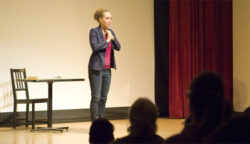Award-winning actress and playwright Fanshen Cox DiGiovanni performed her one-woman play, “One Drop of Love: A Daughter’s Search for Her Father’s Racial Approval” at the UCSB Multicultural Center Theater yesterday evening.
DiGiovanni, who has appeared in the Academy Award-winning film “Argo,” is the co-creator and co-host of award-winning weekly podcast Mixed Chicks Chat and a co-founder and co-producer of the Mixed Roots Film & Literary Festival.
Her solo performance, “One Drop of Love,” co-produced by Ben Affleck, Matt Damon and Chay Charter, begins with DiGiovanni counting the number of “whites” and “blacks” in the audience in a portrayal of a United States Census Bureau employee in 1790, then transitions into her present-day narrative meeting her husband and getting married in 2006, only to have her father decline attending her wedding.
In the beginning of “One Drop of Love,” DiGiovanni explains that her father’s refusal to walk her down the aisle was likely the result of disapproval toward her European spouse.
“My dad was born in 1936 in Jamaica when Jamaica was still a British colony. Now his mom — my beloved grandma Cynthia — worked as a live-in nanny and a maid for this British naval officer and pretty much left my dad to raise himself,” DiGiovanni said. “Not exactly the most comfortable introduction to Europeans.”
During the show, DiGiovanni takes on the personas of four different family members: her brother, her grandmother, her politically liberal white mother and her pro-Pan-African Movement black father, with whom she struggled to connect as a multiracial child.
“So my parents divorce when I’m seven and aside from a very few awkward moments with my white mother, I have very few memories of my dad ever speaking to a white person,” DiGiovanni said.
DiGiovanni alternates between scenes of racial categorization by the U.S. Census Bureau in the late 1700s and her personal narrative about growing up as a multiracial youth in cities across the United States and in West and East Africa. Using filmed images, photographs and animation, she explains the development of “race” in the U.S. and how it affected her identity and her relationship with her black, Jamaican father.
Over the course of the play, DiGiovanni explores her family history in order to reconstruct her racial identity and confront her father about his absence at her wedding. She said this process gave her insight into her heritage and ultimately allowed her to feel more comfortable with her personal identity.
“Today, especially having done this and reconnected with my dad, I feel stronger in my black identity as well as in my mixed identity,” DiGiovanni said. “I feel stronger, and I feel so much more relaxed about it. Unfortunately, it took a long time, and it might take you guys a long time, but just know that you will feel comfortable at some point. I think the sooner we can all get there, it will really help in terms of looking at racism.”
Third-year sociology major Ryan Yamamoto, who opened for DiGiovanni’s show with a spoken word piece, said DiGiovanni’s message about the fluidity of identity bears significance for all people regardless of ethnic background.
“Even not necessarily being black and white … there are parallels. Obviously not the same story because there are different levels of oppression, but there were parallels, and I felt it was really powerful,” Yamamoto said. “Who you are at one point in your life doesn’t necessarily mean you’re going to be that person after. There is no right or wrong in choosing identities.”
Third-year sociology major Yasmeen Todd said DiGiovanni’s play aimed to do away with individual racial categorization and instead advocate for humankind as a “race-less” whole.
“I definitely liked the message she was trying to convey about loving everybody,” Todd said. “It doesn’t matter what race you are. You should be able to understand each other and have these conversations with people about your race and not be afraid to talk about it.”
DiGiovanni said she encourages audience members to celebrate their ancestry and actively seek to educate themselves about ethnic roots while still maintaining civility amidst dissenting opinions.
“One of the things I’ve learned when I was going through a period of strong black identity in college was that I was angry, and so my conversations with people were angry, and there’s nothing wrong with that,” DiGiovanni said. “But y’know, folks don’t really want to listen when you’re real angry. I am an educator so I’m always deciding, ‘Do I want to teach a lesson here or do I want to self-preserve?’”
DiGiovanni said she hopes that her show acts as a catalyst for people to foster an open dialogue with family members in order to gain a more thorough and comfortable understanding of ancestry, origin and identity.
“Identity — it’s fluid. I do think we get to empower ourselves more by choosing what we want on a daily basis,” DiGiovanni said. “I know I change all the time, and that’s empowering that we can do that, as long as we remember that with doing that we have to be sensitive about those who just can’t.”






















Sorry, I’m just now getting aroune to reading the review of your show. I love the format and style of the show, with its audience interaction. It shows promise of stirring this nation to wake up to its ways and values, and even more important, of getting people to examine themselves and be aware of the suffering that the division has provoked. After seeing the piece on Myrlie Evers’ commencement speech at the University of Mississippi (and of course, the Obama phenomenon) I am beginning to be convinced that young white people are moving in the direction of tossing racism… Read more »